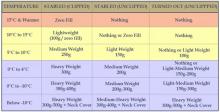As the dark evenings and winter weather seems to drag on and on, horse owners are often forced to change the management of their horses – with more time in the stable, less grass to eat and fewer daylight hours to ride in, some simple steps can help keep our horses in top condition until Spring!
Rugging Up
As the weather turns colder, owners are often tempted to rug their horses and ponies to keep them toasty warm – especially with exciting new rug designs on the market!
It is important to remember that horses don’t feel cold just because you do – their thermoneutral zone (the temperature range at which a horse does not need to expend any energy to maintain a comfortable body temperature) is approximately 5-25C, whereas a human TNZ is approximately 18-22C.
Over rugging can cause as many problems as under rugging – hot horses will sweat under their rugs, making them prone to weight loss, skin conditions and even colic.
The table provides a guide to which rugs should be used when.
Feeding
The biggest change to many horses in the winter months is their diet. More time in the stable means an increased intake of hay or haylage, and less grass. Horses are often less keen to drink icy cold water, and therefore their water intake may decrease. When combined with reduced activity, due to less turnout time, impaction colic may result from dry intestinal contents.
The key to keeping stabled horses healthy in the long winter months is fibre – and plenty of it! Horses should ideally have access to fibre at all times, either as hay or haylage, or chopped forage and dried grass products.
Constant access for fibre is not only good for physical health, but keeps horses mentally healthy too – keeping them occupied and reducing boredom. Using small holed haynets can slow the speed at which a horse or pony can eat their hay, helping to keep them occupied for longer. Low sugar stable toys, such as sweede on a string, fibre nuts in a treat ball, or commercial low calorie licks can help to keep your horses brain occupied while he is stuck in the stable hiding from the bad weather.
It is important not to forget the horses and ponies that live out over the winter months. They often need help to stay warm and dry – with some form of shelter from the elements is essential, and careful rugging to keep them comfortable. As the winter progresses, the amount and nutritional value of grass declines, and horses living out will often need supplementary fibre in the form of hay or haylage to keep their digestion healthy and help keep them warm.
As horses are often more reliant on long, drier fibre sources over the winter they really do need their teeth in tip top condition. It is sensible to have their teeth checked by a vet or Equine Dental Technician (a list of BAEDT’s can be found here - British Association of Equine Dental Technicians).
Water
Maintaining water intake is vital to avoid dehydration and subsequent impaction colics. It is important to break the ice on troughs in fields at least twice a day and consider providing buckets of tepid water to encourage horses to drink. Don’t forget to check buckets and automatic drinkers in stables too! Wet feeds such as soaked sugar beet or commercial mashes can also help to maintain water intake in the colder months.
Exercise
While turnout is restricted, maintaining regular exercise is vital, both to keep the guts moving and keep horses from becoming bored. Icy ground and dark evenings can make riding difficult, but leading in hand for 10-15 minutes twice a day will make a difference. Consider using poles on the ground or other obstacles to add interest if you have a safe area.
If you are able to get out hacking, please ensure you and your horse are wearing hi viz so you are safe on the roads.
Worming
As part of your horses annual strategic worming plan, the winter months are the time that all horses need to be treated for encysted redworms, alongside ongoing monitoring for intestinal roundworms and tapeworm. Please contact the practice for further advice on year-round worm control - 01363 772860.





